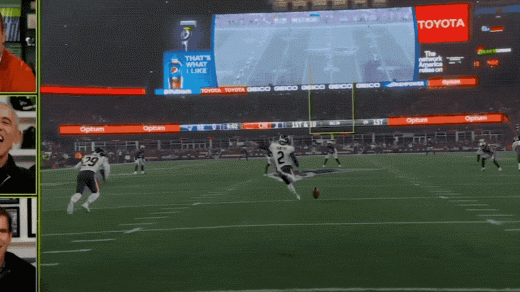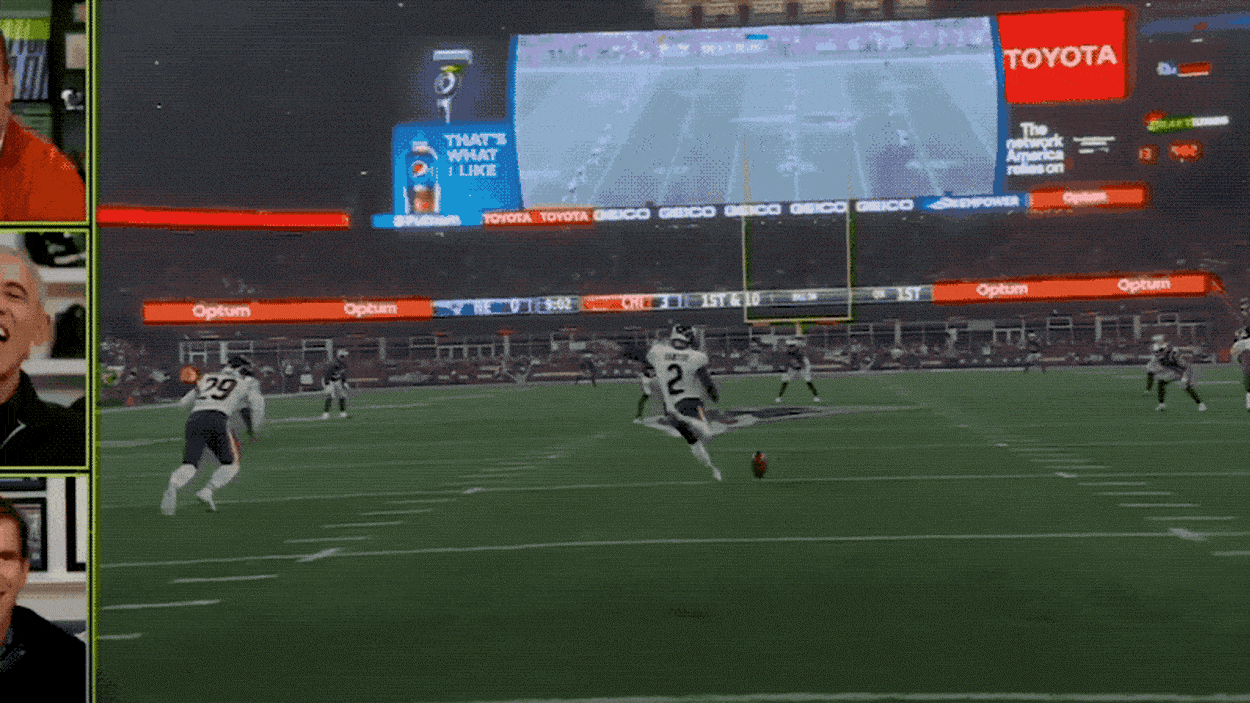What ‘The ManningCast’ tells us about the future of how you’ll watch sports
“A couple years ago, we were on a golf trip and I was trying to take a nap,” legendary former NFL quarterback Peyton Manning explained. “And I was kinda in a corner bed and [Eli] came up behind me and he kinda had me leveraged into the wall, and he gave me a wedgie. He almost went atomic wedgie.”
This atomic anecdote was a response to The Ringer founder Bill Simmons’ question about the last time Peyton and his younger brother Eli Manning had a fight. This wasn’t on one of The Ringer’s many podcasts, but a December episode of the Manning brothers’ “ManningCast” show on ESPN 2 and ESPN +, which airs as an alternate telecast for Monday Night Football.
“The ManningCast,” which just wrapped up its second season during last night’s Cowboys-Buccaneers NFL playoff game, has continued to evolve since its debut in 2021, and is a peek into the future of sports broadcasting.
Described by some as a hybrid of an NFL broadcast, friends hanging out in a bar, a Zoom call, and a late-night TV interview, the show leans into the unpredictability of two brothers bantering over a live football game, all while chatting with a mix of guests from former and current NFL players and coaches to celebrities and even former president Barack Obama.
“Football is always more fun when you watch it with friends,” Peyton tells me when we chat before the NFL wildcard weekend kicks off. “Eli and I get to sit on our couches and watch it together, and the viewers are all of our friends, and the guest is just right there with us. We’re on the couch, we’re at a bar, let’s have a conversation. I may interrupt you if the Bears throw a post-route here, but I want you to come back and finish that story in a minute. That’s how we’re doing it.”
And it’s working. While Peyton’s on-camera and comedic chops have been on display for decades now, through a laundry list of funny commercials and SNL appearances, the show has seen Eli emerge as an equally strong force for laughs—much of it at his older brother’s expense.
Eli says that the flow of conversation on the show is anchored in the game itself. “If there’s great football happening, and it’s a tight game, you want to keep it about football,” he says when we speak. “But if it’s a blowout, you have to do something else, maybe tell a story, take a shot at Peyton, you don’t know where that’s going to go. It’s authentic. That’s what would happen if we were sitting on the couch watching the game and it’s a bit boring; I might take a pillow and throw it at my brother’s head. Why’d you do that? I don’t know, I was bored. That’s what brothers do. And we take the same approach here. I can’t throw a pillow at him, but I can take a shot, just to get away from the game for a second.”
The show’s first season averaged 1.6 million viewers each week. Its second season debut drew 1.5 million viewers, an 86% increase from its premiere a year earlier. It also has a median viewer age of 48, compared to 54-years-old for the traditional broadcast. The NFL’s chief media and business officer Brian Rolapp says that the league has been experimenting for a few years with alternate telecasts, in order to reflect the diversity of its massive audience. (Eighty-two of the top 100 TV broadcasts in 2022 were NFL games.) These include all-female commentators on Amazon with Hannah Storm and Andrea Kremer, and a telecast produced with Nickelodeon aimed at younger viewers. But ‘The ManningCast” has separated itself from the others in terms of its popularity. Rolapp aims a lot of the credit for that directly at Peyton and Eli. “Yes, they are members of the most famous football family in America, and yes, they both had incredible careers at the sport’s most visible position,” he says. “But it’s really their personalities, the sibling dynamic, the comedy, the guests, all of that combined with a deep knowledge of the game, and then placed in an open and loose setting that makes this magic happen.”
Both Manning brothers say that they worked with ESPN and Peyton’s own Omaha Productions between the first and second seasons to improve the show without losing its unscripted, casual feel. Part of that is knowing when to ask a guest a question that may have a longer answer. “Things like, don’t ask a question when the ball is in the red zone, and someone is about to score a touchdown,” says Eli.
Peyton says season two was stronger in that they worked more to have guests on during games that their favorite teams were playing. “To have President Obama on when the Bears were playing was awesome,” says Peyton. “Bill Simmons is on record saying he’d never talk to Eli Manning, but here he was talking to us while watching a Patriots game,” says Peyton. “Having people on when their favorite team is playing allows you to strike that balance between talking to them as fans, but also about the game as it’s happening.”
Because of the Mannings’ success, the alternate telecast conceit is certainly catching on, and Omaha Productions has now produced shows with ESPN for college football with Pat McAfee; the “GronkCast” for UFC fights, hosted by Rob Gronkowski and his brothers; and for the PGA Championship hosted by Joe Buck and caddie-comedian-analyst Michael Collins.
Peyton is conscious of flooding the market with too much of a good thing but says the demand is there. “I think it’s a sign that we’re doing something right,” he says. “It’s not for everyone, but it’s a different option.”
Eli says that it’s just a matter of finding the right chemistry for other sports. “It can’t be a copy of our format exactly,” says Eli. “There are versions of it that can work, and it’s just about finding the right balance for each sport. It’s neat to have a different take on each sport, and fine-tuning it to make it a unique experience for fans.”
The two brothers are also conscious of balancing the demand for their own show. Despite its popularity, both Peyton and Eli think the show should stick to just 10 episodes.
“One thing I think comes through is just how much Eli and I enjoy this,” says Peyton. “We laugh a lot. If you maybe go to 17 games, maybe we’re not laughing as much, and it starts to get repetitive. ESPN has certainly mentioned going up to 12 games or more, and Eli and I held strong. We just feel the show is better if we keep it to the 10.”
Eli believes that the breaks from the show actually make it stronger. “I don’t want to see him every week and get his voice memos of breaking down (game) film,” Eli laughs. “There’s something to people wanting more, and if we’re on too much, they might not want more. It keeps me motivated.”
(23)



